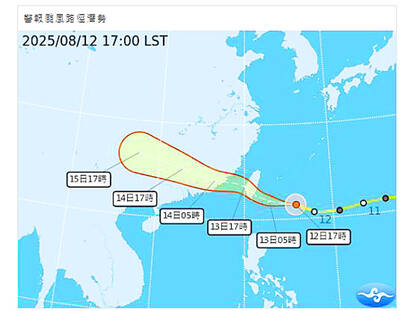The Ministry of Justice (MOJ) said it is seeking to amend the law so that a death sentence can only be handed down when all three judges in a case approve the sentence.
Current law stipulates that a death sentence can be handed down with a majority verdict, which means two of the three judges in a court can decide the ruling. Passage of the amendment would make death sentences more difficult to secure and thereby reduce the number of state executions.
A ministry official told the Taipei Times yesterday that the MOJ and the Judicial Yuan would cooperate to amend the law.
The ministry has also asked the Judicial Yuan to amend the law so that the Supreme Court would have to meet and debate any review of a death sentence handed by the Taiwan High Court, the official said.
He said that at the moment the Supreme Court usually only reviews the legal documents but does not debate the matter.
The official said that the ministry would also ask prosecutors to no longer propose a death sentence to the court when indicting suspects accused of serious crimes.
The Democratic Progressive Party (DPP) government promised in 2000 to abolish the death penalty, but the ministry has since suggested that Taiwan might not be able to do this in the near future because a majority of Taiwanese believe that capital punishment is the most effective means of deterring serious crime.
Given this, the ministry has tried to carry out as few executions as possible. The ministry either files extraordinary appeals to the Supreme Court to keep prisoners sentenced to death alive, or delays their executions.
Ministry figures show that the number of executions has been decreasing for years. Thirty-two prisoners were executed in 1998, a number that shrank to 10 in 2001 and to three each in 2004, 2005 and in 2006. No executions were carried out last year.
DPP presidential candidate Frank Hsieh (
Chinese Nationalist Party (KMT) candidate Ma Ying-jeou (

DEFENSE: The first set of three NASAMS that were previously purchased is expected to be delivered by the end of this year and deployed near the capital, sources said Taiwan plans to procure 28 more sets of M-142 High Mobility Artillery Rocket Systems (HIMARS), as well as nine additional sets of National Advanced Surface-to-Air Missile Systems (NASAMS), military sources said yesterday. Taiwan had previously purchased 29 HIMARS launchers from the US and received the first 11 last year. Once the planned purchases are completed and delivered, Taiwan would have 57 sets of HIMARS. The army has also increased the number of MGM-140 Army Tactical Missile Systems (ATACMS) purchased from 64 to 84, the sources added. Each HIMARS launch pod can carry six Guided Multiple Launch Rocket Systems, capable of

GET TO SAFETY: Authorities were scrambling to evacuate nearly 700 people in Hualien County to prepare for overflow from a natural dam formed by a previous typhoon Typhoon Podul yesterday intensified and accelerated as it neared Taiwan, with the impact expected to be felt overnight, the Central Weather Administration (CWA) said, while the Directorate-General of Personnel Administration announced that schools and government offices in most areas of southern and eastern Taiwan would be closed today. The affected regions are Tainan, Kaohsiung and Chiayi City, and Yunlin, Chiayi, Pingtung, Hualien and Taitung counties, as well as the outlying Penghu County. As of 10pm last night, the storm was about 370km east-southeast of Taitung County, moving west-northwest at 27kph, CWA data showed. With a radius of 120km, Podul is carrying maximum sustained

Tropical Storm Podul strengthened into a typhoon at 8pm yesterday, the Central Weather Administration (CWA) said, with a sea warning to be issued late last night or early this morning. As of 8pm, the typhoon was 1,020km east of Oluanpi (鵝鑾鼻), Taiwan’s southernmost tip, moving west at 23kph. The storm carried maximum sustained winds of 119kph and gusts reaching 155kph, the CWA said. Based on the tropical storm’s trajectory, a land warning could be issued any time from midday today, it added. CWA forecaster Chang Chun-yao (張竣堯) said Podul is a fast-moving storm that is forecast to bring its heaviest rainfall and strongest

TRAJECTORY: The severe tropical storm is predicted to be closest to Taiwan on Wednesday and Thursday, and would influence the nation to varying degrees, a forecaster said The Central Weather Administration (CWA) yesterday said it would likely issue a sea warning for Tropical Storm Podul tomorrow morning and a land warning that evening at the earliest. CWA forecaster Lin Ting-yi (林定宜) said the severe tropical storm is predicted to be closest to Taiwan on Wednesday and Thursday. As of 2pm yesterday, the storm was moving west at 21kph and packing sustained winds of 108kph and gusts of up to 136.8kph, the CWA said. Lin said that the tropical storm was about 1,710km east of Oluanpi (鵝鑾鼻), Taiwan’s southernmost tip, with two possible trajectories over the next one